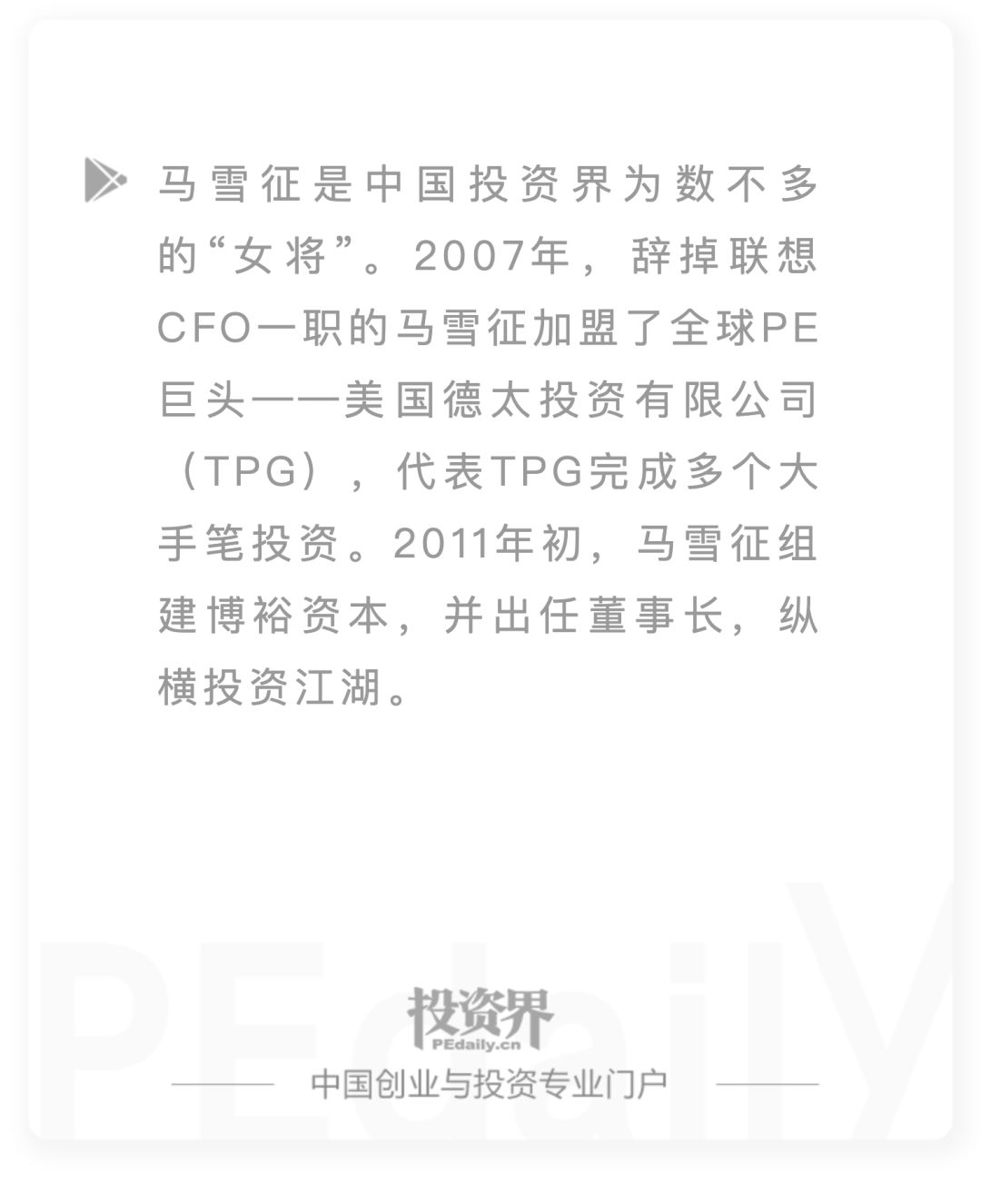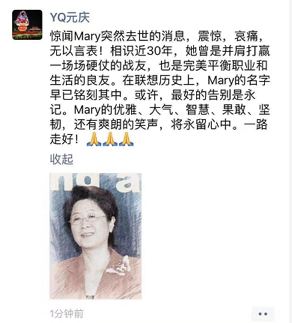The best farewell is forever.
Editor’s note: This article is from WeChat public account “investment sector” (ID: pedaily2012 ), author Ren Qian.
belongs to the generation The glorious history of “Investing in Women” has unfortunately put a full stop .
On September 2, Lenovo Group Co., Ltd. (0992.HK) announced that the board of directors of the company had painfully announced that Ms. Ma Xuezheng, an independent non-executive director of the company, passed away on August 31, 2019. Subsequently, Yang Yuanqing, the chairman of Lenovo Group, said in a circle of friends: “I was shocked and saddened by the death of Mary (Ma Xuezheng).”
Ma Xuezheng is one of the few “female men” in the Chinese investment community. In 2007, Ma Xuezheng, who resigned from Lenovo’s CFO, joined the global PE giant, Teddy Investment Co., Ltd. (TPG), to complete several large investments on behalf of TPG. At the beginning of 2011, Ma Xuezheng established Boyu Capital and became the chairman of the board of directors.
In the past few decades, from Lenovo to the PE industry, Ma Xuezheng has left a section of legendary resume.
“Mulan” behind Liu Chuanzhi:I once dominated the “snake swallow” classic battle
Reviewing Ma Xuezheng’s career, she has more than ten years of experience in every field of research, career, and investment.
After graduating from Capital Normal University in 1976, Ma Xuezheng went to King’s College of the University of London to study. After returning to China, he went to the Chinese Academy of Sciences to study English literature. In this top scientific and technological academic institution that has frequent contact with scholars and Nobel Prize winners, it has become the youngest director and director of the Chinese Academy of Sciences.
In the Chinese Academy of Sciences, Ma Xue is responsible for managing scientific research projects jointly developed by China and Europe.The Bank has given him administrative management and contact work for research and loan projects in China, which has allowed her to accumulate rich experience in international affairs and financial management.
In 1989, Ma Xuezheng successfully applied for the position of Assistant General Manager of Lenovo in Hong Kong with a fluent English. In 1992, Ma Xuezheng was promoted to the group’s deputy general manager. He led the planning of the milestones of Lenovo’s listing, group merger and spin-off in 1994. He was also the direct trader of the IBM PC merger and acquisition case, and also participated in the formulation of Lenovo’s development strategy. “Fortune” magazine once described this: Lenovo became the Lenovo of today, Ma Xuezheng contributed.
Ma Xuezheng claims to be a woman who can fight anywhere. And the beautiful embarrassment she made in Lenovo Group is enough to make her go out of the limelight.
In 1997, Ma Xuezheng hosted the merger of Hong Kong Lenovo and Beijing Lenovo. At the time, Lenovo encountered the first stock price trough after its listing in 1994. Ma Xuezheng came up with an idea to raise money to change the share capital structure. In just two years, Lenovo’s capital was revitalized, and the stock price soared from 0.4 yuan to 7 yuan, a tenfold increase.
A brand new Lenovo was born at the forefront of the international capital market. Ma Xuezheng also performed very well in a series of major actions of Lenovo, including Lenovo’s entry into the company, Lenovo’s cooperation with PCCW, Lenovo’s stock split, and Lenovo’s venture capital investment. The fund, as well as Lenovo and AOL Time Warner reached a strategic alliance.
In 2000, Ma Xuezheng officially became the CFO of Lenovo Group, where he was in charge of Hong Kong branch, strategic investment and investor relations. During this period, Liu Chuanzhi once joked: “I am working for Ma Xuezheng.” Because Ma Xuezheng is behind the scenes of the operation of Lenovo Capital, her reputation in the Hong Kong investment community even surpasses Liu Chuanzhi.
The most classic battle played by Ma Xuezheng is Lenovo’s acquisition of IBM’s PC business.
On December 8, 2004, Lenovo Group completed the “Snake Swallow” merger and acquisition, and announced the acquisition of IBM PC business for US$1.75 billion (US$650 million in cash, US$600 million in Lenovo stock, and IBM US$500 million in net debt). department. Since then, Lenovo has become the world’s third largest PC manufacturer and ranks among the world’s top 500. This transaction is the beginning of Lenovo’s comprehensive internationalization and is one of the first explorations of huge overseas mergers and acquisitions by Chinese private enterprises.
But in fact, there is a long-term battle behind the negotiations on the acquisition. In 2004, Lenovo’s $1.25 billion in cash for the acquisition was almost equivalent to Lenovo’s 73% market value. At the same time, the IBM PC business has suffered losses for several years, and almost no one thought it would be a successful deal.
Liu Chuanzhi once recalled that in a speech at the EMBA class of Peking University Guanghua School of Management, he invited the entrepreneurs present to raise their hands and asked how many people thought that Lenovo could succeed in mergers and acquisitions. More than 90 people in the class, only three people raised their hands. And two more are the students of the past. Such concerns and objections have also occurred within Lenovo’s board of directors..
Looking at this transaction that may bring Lenovo into the international market, as a supporter of the acquisition, Ma Xuezheng did not choose to confront the opponents on the board of directors. Instead, I turned to three third-party companies and arranged them to analyze the pros and cons of the mergers and acquisitions to the directors of the holding company. Finally, Legend Holdings approved the transaction proposal.
Because of the full participation in Lenovo and IBM PC negotiations throughout the year, Ma Xuezheng is very familiar with the various problems that may be encountered, and is quite professional. In this way, a Chinese woman integrates and manages financial teams around the world.
43 years of legendary history:From Lenovo CFO to the investment world “woman”
In May 2006, when the first financial report after Lenovo’s acquisition of IBM was released, Ma Xuezheng filed a retirement application. In September of the following year, Ma Xuezheng retired from the position of CFO and joined TPG, the top private equity investment company in the United States, as a partner.
Founded in 1992, TPG has extensive experience in private equity investment activities such as leveraged buyouts, minority equity investments, joint ventures, business spin-offs and corporate restructuring. It is understood that TPG is good at corporate acquisitions and holding investments in European and American markets, and focuses on minority equity investments in emerging markets in Asia, becoming an important shareholder of the invested companies.
TPG’s Asian Investment Business (formerly known as Newbridge Capital) was established in 1994 and is one of the largest private equity investment institutions in the Asia Pacific region.
The rapid retreat from the peak position has caused a lot of discussion in the PE industry. This move, which is difficult for outsiders to understand, is the wish of Ma Xuezheng for six years.
Ma Xuezheng is not unfamiliar to the PE industry. In 2005, TPG became a shareholder of Legend Holdings, from “initial negotiations, fights to coordinated operations to acquire IBM PC”, she is the actual trader behind. However, in 2007, Ma Xuezheng’s judgment on himself was still “a limited understanding of PE. I feel that most of them should be playing with financial skills or investment banking.”
When she was interviewed by the media, she described the initial life of TPG as “intensively looking at the business”, sometimes even two or three times a day. I saw more than 100 companies in 2008 and 2009, and it is not repeated.
At TPG, she is looking at projects that are more than $100 million. “I really don’t know how to invest in private equity funds. My strengths are actually in the judgment of the company and in corporate finance, but I can learn quickly when I invest.”
In August 2009, Wumart announced the introduction of TPG Asia, Hony and Legend Holdings through a private placement of 150 million shares. The additional issuance raised a total of 1.65 billion yuan. After investing in Daphne, this investment is the second single that Ma Xuezheng team has invested in China.
Ma Xuezheng, which is faster than expected, seems to haveIt has been well adapted to the new role of investors. According to the “China Entrepreneur” magazine’s 2010 report, Ma Xuezheng’s joining is a key part of the TPG localization process. “Because she has done it in the enterprise, she is very good at empathy and helping entrepreneurs to lift many doubts about PE. Her usual style of communication and outstanding affinity are rare among TPG professionals who are financial, investment banking, and good at corporate valuation.”
Even in the US PE industry, female investors are rare. This makes Ma Xuezheng more special. She needs to prove that a person who has no independent entrepreneurial experience and rich investment banking experience can also become a first-class investor.
Creating Boyu Capital,Invisible Great Wall in China PE
In 2011, Ma Xuezheng founded Boyu Capital and formed his own fund. The impression that Boyu Capital gives to the outside world is mostly low-key and mysterious.
Tianshicha shows that Boyu Capital is an investment fund focused on private equity investment in Greater China. Zhang Zixin, former general manager of Ping An Group, and Ma Xuezheng, former Chinese executive of TPG Capital Established.
At present, Boyu Capital manages a US dollar fund with a total fundraising scale of nearly US$10 billion and is one of the largest private equity investment companies in China. In 2011, Boyu Capital launched the first $1 billion fund. The main LP funders were large Asian investors, such as Singapore’s sovereign wealth fund Temasek Holdings and Li Ka Shing Foundation.
By investment in small-scale equity or relative holdings, Bo Yu invests in outstanding enterprises in the high-growth industry, providing capital and management support for corporate growth and restructuring of state-owned enterprises, mainly to consumer goods and retail, financial services, medical health, and media. And high-tech industry.
Public information shows that Boyu Capital manages 12 funds and has nearly 40 public investment events. Representative investment cases include: 2012 investment in Alibaba; investment in the same journey in 2014, COFCO meat; participation in WuXiang Kang privatization investment in 2015, strategic investment in Jinyu Medicine; 2016 strategic investment in MicroBank, cornerstone medicine; 2017 Invest in iQiyi and so on.
In 2018, Boyu Capital Investment began to accelerate, investing in China Chengxin Credit, Tengsheng Bo, Trax, and Rui Gene, Klook Road, Tongrun Biomedicine, Connected Digital, Netease Cloud Music, etc. In 2019, Boyu Capital invested in glutinous rice ticks, Aikang Guobin, Water Drop Mutual Aid, Deqi Medicine, and the latest one that attracted 1 billion RMB for mutual help of water droplets was particularly eye-catching.
In terms of exit, Boyu Capital is also fruitful. For example, on May 8, 2018, WuXi PharmaTech was listed, and 42 well-known capitals were made up, including Bo Yu Capital. Behind the cornerstone drug listed in February this year, BoyuCapital is also among the top three shareholders.
Alibaba was one of the classic cases of Boyu Capital. In 2012, CIC joined CITIC Capital, CDB Capital and Boyu Capital to invest in Alibaba Group, totaling US$2 billion. According to the “Wall Street Journal” reported at the time, including the consortium of Bo Yu, the acquisition of a 5.6% stake in Alibaba.
This year, Alibaba is about to return to Hong Kong for listing. I did not expect that Ma Xuezheng died of illness and was embarrassing.
Recommended reading

